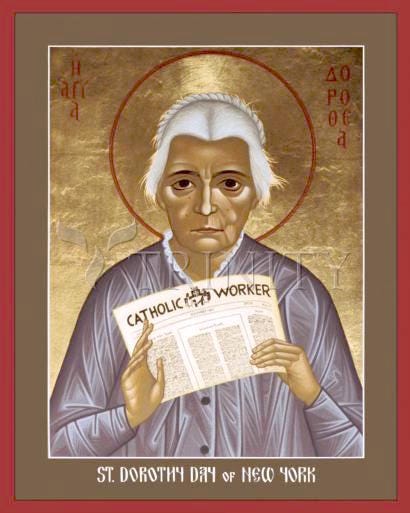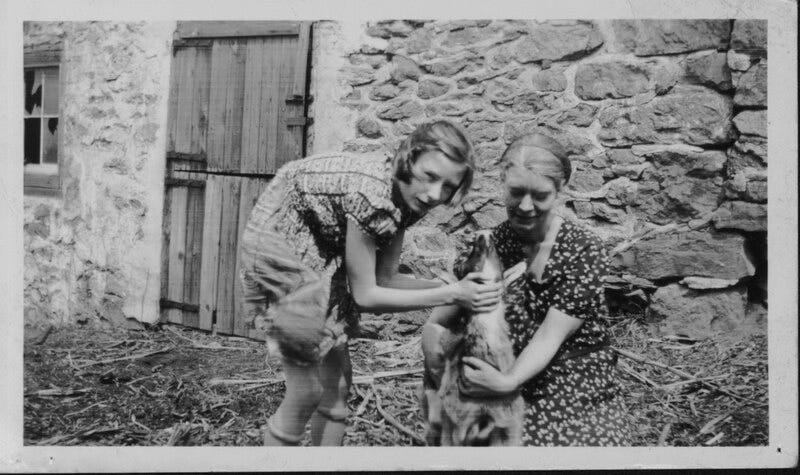The Sayings of Abu Francis
Dorothy Day, the Communist-turned-founder of the Catholic Worker movement, was born on Nov. 8, 1897. By the time she passed away in 1980, she had built a visionary legacy for transforming the world, one small thing at a time.
“Today we are not content with little achievements, with small beginnings,” she lamented in House of Hospitality, published in 1939. (Surprise - even then, people's lives were fraught with complexity and frantic activity!) Here's the rest of “Small Things.”
We should look to St. Teresa, the Little Flower, to walk her little way, the way of love. We should look to St. Teresa of Avila, who was not content to be like those people who proceeded with the pace of hens about God's business, but like those people who on their own account were greatly daring in what they wished to do for God.
It is we ourselves that we have to think about, no one else. That is why the saints worked. They paid attention to what they were doing, and if others were attracted to them by their enterprise, why, well and good. But they looked to themselves first of all.
Do what comes to hand. Whatever your hand finds to do, do it with all your might. After all, God is with us. It shows too much conceit to trust in ourselves, to be discouraged at what we ourselves can accomplish. It is lacking faith in God to be discouraged.
After all we are going to proceed with his help. We offer him what we are going to do. If he wishes it to prosper it will. We must depend solely on him. As St. Ignatius says, work as though everything depended on us and pray as though everything depended on God.
A Catholic farmer, too
Dorothy helped promote the three-point “constructive program” formulated by Catholic Worker co-founder, Peter Maurin: Round-table Discussions, Houses of Hospitality and Farming Communes. “This program is so simple as to be unsatisfactory to most, who look for something to be complicated before it can be successful,” she wrote in 1936. “Remembering the words of St. Francis that we cannot know what we have not practiced, we have tried not only to publish a paper but to put our program into practice.”
The third point of the program – Farming Communes – remained to be practiced until a carload of Catholic Workers left the confines of New York City for a 28-acre parcel of land in Easton, Pa.
Dorothy and her daughter Tamar give the goat some love in 1937.
By most accounts, Dorothy could not meet the challenge of creating a self-reliant, surplus-to-share farming community. The Workers retreated to the urban setting where the economic crisis drove the Houses of Hospitality. But more farming-based models were tried and are finding expression today more than ever. This new resurgence of Peter's third strategy – especially in the urban setting – is what I'm calling the Catholic Farmer movement.
My birthday present
At a time when many of us feel orphaned both politically and spiritually, it is encouraging to read how Dorothy felt many of the same things. The world we seek to build cannot be found on our ballots. Neither is it being proclaimed in our churches (although Pope Francis preaches it every Sunday). In gratitude for Dorothy's example, I'd like offer back 10 Small Things Close to Hand.
1. Capture your own water. Winter is upon us in the Northern Hemisphere and that means precipitation. Whether you use buckets and trashcans or 2,500-gallon tanks, capture as much water as you can.
2. Build your own soil. Let falling leaves lie. Ask your neighbors for their bags of yard debris. Find wood chip piles or buy mulch. Building layers of soil instead of tilling helps sequester carbon dioxide in the soil.
3. Make your own fertilizer. Topsoil needs organic material for better plant growth. Compost kitchen scraps, garden clippings, leaves, manure and other organic castaways in barrels, buckets or piles. Gardens are always hungry for fertility.
4. Grow your own food. Kill your grass and weeds with sheet mulch (cardboard covered with wood chips) and plant food gardens. Plant food you actually eat, so you can eventually phase out buying it at the grocery store. Fruit and nut trees are great perennials for long-term eating. Stop eating corporate factory-farmed methane-producing meat immediately – find local protein sources.
5. Own your home. If you have access to land, build an energy-efficient home or tiny house. If you have a mortgage, pay it off in the next five years (this may take borrowing from friends and family, but it’s better to pay them back than the banks). Pay down the mortgage by liquidating any Wall Street investments, including IRAs. If you rent, make sure your landlord is a friend or in small-scale business and will let you lease long term. If you’re in a tenant mill, sustainable housing might require a move or purchase.
6. Use your own energy. Minimize your use of electricity, which is most likely generated by burning fossil fuels (yes, that includes natural gas). Invest in a small-scale solar system to run lights, phones and computers, and to charge batteries. Phase out large refrigerators and freezers. Shift from air conditioning to fans.
7. Transport yourself. Get to a place where you can meet most of your travel needs by walking or riding a bicycle. You might need a different job if you can’t telecommute. If you have a vehicle, find ways to use it less and less. Share rides and carpool whenever possible.
8. Keep your money in your neighborhood. Move out-of-town bank accounts to local credit unions. Buy locally made products whenever possible instead of importing stuff via Amazon. Discontinue business with corporate chains.
9. Join neighborhood trading/barter networks. Phase out your daily need for cash by trading with neighbors, bartering or joining a local alternative-currency network or mutual-aid group. Use social networking to give unneeded stuff to neighbors.
10. Migrate by design. If you don’t live in a sustainable place (i.e. your region needs to import water, food and energy from somewhere else), consider moving. You have five years to find a better place. Maybe there are other Catholic Farmers just waiting for you to lead the way.
Happy Birthday, Dorothy!
What say you?





